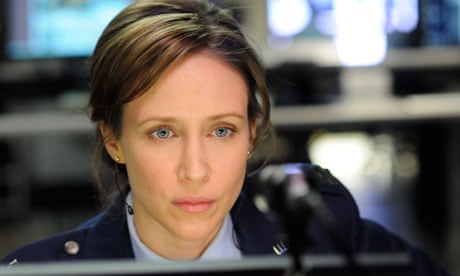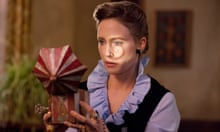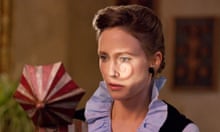In the garden of Vera Farmiga's home in upstate New York, the grass is stained by a patch of darkened ash. Every time she is sent a script she doesn't like – a script that is badly written or underdeveloped or contains unchallenging female characters in a state of semi-permanent undress – Farmiga (pronounced "Far-mee-ga") puts it to one side. Then, when the pile of unwanted scripts is big enough, she builds a bonfire and burns them.
"They do get thrown in and used for fertiliser," she explains with a quiet, apologetic laugh. "It's recycling. Bonfires need to be fed and scripts, after all, are wood." There is a pause. "Especially the wooden ones."
One imagines there are a lot of scripts that end up on Farmiga's bonfire. Over the last year, the mother-of-two has become one of Hollywood's most sought-after actresses despite – or, more likely, because of – the extreme care she takes in choosing roles. After a breakthrough performance as a closet drug addict in the 2004 independent film, Down to the Bone, which was greeted with critical acclaim but only modest box-office success, Farmiga spent the rest of the decade playing a series of subtly rendered supporting characters in mainstream movies. She was a troubled police psychiatrist in Martin Scorsese's The Departed, a philosophical Romanian prostitute in Anthony Minghella's Breaking and Entering and the wife of a concentration camp commandant in The Boy in the Striped Pyjamas.
Then, last year, she appeared in Up in the Air, playing Alex, a self-assured, sexually amoral businesswoman racking up the frequent flyer miles alongside George Clooney. The film was an unexpected hit and Farmiga was nominated for an Oscar for best supporting actress.
"The response was amazing," she says. "I think women were just so pleased to see the tables turned. It's so common to see a movie with a man exploring his unsettled streak, his sexuality in the way that Alex does. Oftentimes, you do see the woman being shafted and it was refreshing to see a woman who was in control and unapologetic about her sensuality, desire and needs."
Now, having finally shrugged off the "up-and-coming" tag, the 37-year-old actress is appearing in her first big-budget, all-action thriller. Source Code, by British director Duncan Jones (who is David Bowie's son and who made his name with the offbeat, low-budget sci-fi movie Moon), tells the story of a soldier played by Jake Gyllenhaal, who wakes up in the body of an unknown man and discovers he is part of a mission to find the bomber of a Chicago commuter train. The catch is that he only has eight minutes in which to do so.
What would Farmiga do if she only had eight minutes left to live? "Ideally, I wouldn't be running around a train," she says. "If I was on a high-stakes mission to save the world I might reconsider, but I really would just rather spend it in a really foofy bed with my husband and my children, soul-gazing."
In Source Code, Farmiga plays a very un-foofy air force officer who is Gyllenhaal's only contact with the outside world. She says she almost didn't take the role because she was felt that her character "was not that stimulating on the written page". But then she began to see the script as a challenge, so it escaped the bonfire.
The resulting performance is classic Farmiga, displaying her uncanny ability to hint at the hidden depths within a character who could, in other hands, be little more than a superficial adjunct to the plot. On screen, she possesses a rare combination of luminescence and a mastery of nuance, expressing internal conflict with a slight twist of the mouth; conveying a sense of deep emotion through the merest flicker of the eyes. "Often, I find it hard to be still," she admits. "Always, when I get stuck, it's the thought process [of a character] that I return to."
Although Farmiga has the looks of a leading lady – porcelain skin, blue eyes, a beguiling smile – one gets the sense with all her performances that it is what is going on behind the face that counts. "I've always believed that if you are precise in your thoughts, it's not the lines you say that are important – it's what exists between the lines," she says. "What I'm compelled by most is that transparency of thought, what is left unspoken."
No wonder, then, that Farmiga has previously shied away from the big Hollywood studio juggernauts. "I'm least challenged or inspired by those stories," she explains. "I've gravitated towards independent cinema because you have to work harder in studio scripts to flesh out characters, particularly female ones. They are not as sharply edged, they tend to be quite watery. They are not renderings of women as I know them."
Partly in order to rectify the dearth of good female roles, Farmiga has recently directed and starred in her own feature film, Higher Ground, which tells the story of a woman's struggle with faith from her 50s childhood to the aftermath of a spiritual crisis. Well-received at Sundance earlier this year, the film has recently been acquired by Sony.
"I've been very pleased with the reception to the movie," says Farmiga. "I grew tired of asking permission [to play the roles I wanted to play]. With Higher Ground, I thought, 'OK, let's create an opportunity.' It's frustrating because I feel like I work harder to bring life to…" She breaks off. "I mean, I know the roles [for women] are out there but it's just so cut-throat and everyone's vying for them."
She doesn't strike me as being particularly cut-throat, I say.
"Umm…" There is a long pause. "It depends on the subject matter. No, I won't harm someone else to get my own experience but I am demanding. I demand a lot from myself." Later, she adds: "Am I ambitious? I used to be afraid of that word but now I think ambition is a good thing. My ambition is to be inspired perpetually and I don't think it's too much to ask." She laughs. "I won't take anyone down for it, but I will go white-knuckle for it."
The fact that Farmiga remains driven by the need to do interesting work means she is correspondingly uncomfortable with the idea of too much fame. "The more famous you are, the harder it becomes because you're demystified. The more people know about you, the more face-time you get in the media, the harder your job becomes to create a character in whom people suspend disbelief. Honestly, I cherish the position I'm in – I do have respect but I can hide away."
Her feet are kept planted firmly on the ground by her family. The second of seven children, Farmiga was brought up in New Jersey by her Ukrainian immigrant parents – Mykhailo, a computer systems analyst, and Luba, a teacher. She attended a Ukrainian Catholic school, toured with a Ukrainian folk-dancing ensemble and didn't speak English until the age of six. For a while, Farmiga had childhood ambitions to be an optometrist or a shepherdess (until recently, she farmed a flock of Angoran goats – "It was a good source of therapy every time I finished a movie and felt depressed"). These days, her parents are rather baffled by what their daughter does.
"They're very sensible and grounded," she says. "They take it with a pinch of salt. You know, I'm one of seven and they want success for all their children. They're proud but they're even more proud now that I've given them grandchildren."
Farmiga and her husband, Renn Hawkey, a carpenter who was formerly keyboard player for the synth-pop band Deadsy, have a two-year-old son, Fynn, and a four-month old baby daughter, Gytta. What if one of her children wanted to be an actor? I ask. "I would encourage them, whatever their convictions are," she says. "I think it can be a noble profession, I really do."



